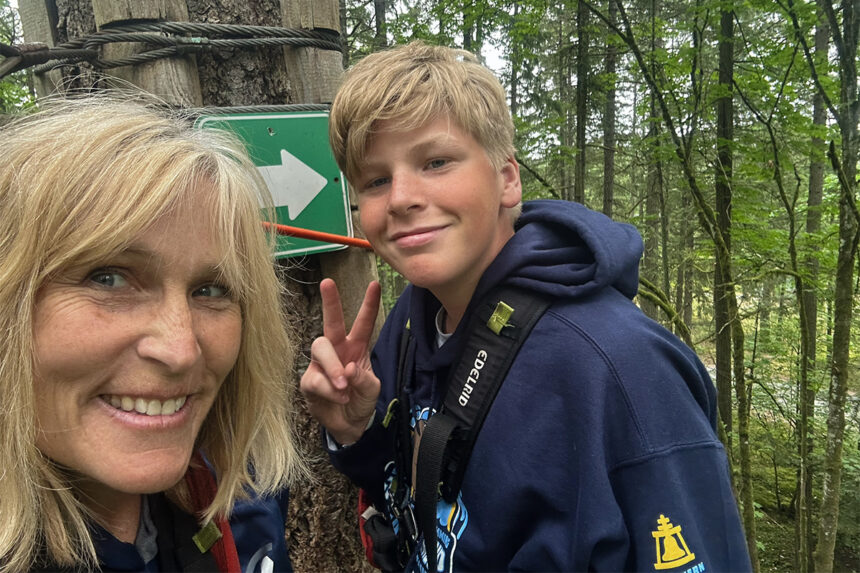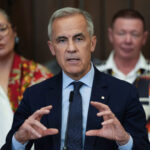I stepped onto a grassy patch overlooking Departure Bay last Thursday, watching a bald eagle circle lazily above the water. Beside me stood Madison Williams, a registered nurse from Arizona who arrived in Nanaimo just three weeks ago. The 32-year-old healthcare worker smiled as she pointed toward the distant shoreline.
“I still can’t believe I get to see this on my days off,” she said, gesturing toward the panoramic view. “Back home, it was just… brown. Everything was brown.”
Williams represents a growing trend I’ve observed while speaking with healthcare administrators across Vancouver Island – American medical professionals trading southwestern desert landscapes and crowded coastal cities for the temperate rainforests and relative affordability of central Vancouver Island.
According to data from the College of Physicians and Surgeons of British Columbia, applications from internationally-educated healthcare workers increased by 23% between 2021 and 2023, with American applicants making up nearly a third of that growth. Island Health confirms they’ve hired 37 American-trained healthcare workers in the past year alone.
Williams’ journey north began during the pandemic’s darkest days. Working 16-hour shifts in a Phoenix hospital where COVID patients filled every available space, she reached a breaking point familiar to many in her profession.
“We were drowning. Everyone was quitting. I couldn’t see myself doing this for another twenty years,” she explained as we walked along the beach. “My brother moved to Victoria in 2019, and every time I visited, I felt this weight lift. When I saw job postings in Nanaimo that paid better than what I made in Arizona, with actual work-life balance, it wasn’t even a question.”
For Williams, the math was straightforward. Her modest two-bedroom apartment in Nanaimo costs roughly the same as her cramped one-bedroom unit in Phoenix. But the clincher was comparative healthcare costs.
“I paid $450 US monthly for insurance with a $5,000 deductible. Here, my MSP is $75 a month after the waiting period. Even as someone who understands the American system, I couldn’t believe the difference.”
Island Health has quietly capitalized on American healthcare dissatisfaction. Recruitment specialist Terri Davidson confirmed the health authority has targeted hiring campaigns in states experiencing high healthcare worker burnout.
“We’ve focused particularly on California, Arizona and Texas,” Davidson explained during our phone conversation. “These are regions where healthcare workers face extreme pressure, housing affordability challenges, and often express concerns about their personal safety in healthcare settings.”
Davidson notes that Nanaimo’s combination of metropolitan amenities, natural beauty, and housing costs still reasonable by BC standards makes it especially attractive to mid-career professionals from high-cost American regions.
“When someone from San Diego or Seattle looks at Nanaimo’s housing prices, they still see tremendous value,” she said. “Add universal healthcare coverage and significantly reduced workplace violence compared to many American hospitals, and it becomes very compelling.”
The trend isn’t limited to nurses. Dr. Marcus Chen, a family physician who moved from Oakland to Nanaimo last year, told me his decision came down to quality of life and professional autonomy.
“In California, I spent half my day arguing with insurance companies instead of treating patients,” he explained as we met at a downtown café. “My patient load was 35 to 40 people daily. Here, I see 25 to 28 patients, and I can actually help them without insurance barriers.”
Chen and his wife purchased a four-bedroom home near Westwood Lake for roughly the price of their Oakland townhouse. His commute shrank from 45 minutes to 10, and weekends now include hiking and kayaking rather than recovering from workweek exhaustion.
“My colleagues thought I was crazy to leave a prestigious position. Now half of them are asking how they can follow,” Chen laughed.
The influx hasn’t been without challenges. Clinical nurse educator Samantha Leung, who helps integrate international nurses at Nanaimo Regional General Hospital, points to several adjustment hurdles.
“The American healthcare workers arrive with excellent technical skills but need to adapt to our systems and charting methods,” Leung explained. “There’s also cultural adaptation – understanding Canadian healthcare values, which prioritize universal access over profit-driven models.”
Leung has developed a specialized orientation program for American healthcare professionals, addressing everything from metric conversions to understanding BC’s approach to Indigenous healthcare.
The migration benefits Nanaimo residents directly. According to Island Health’s quarterly report, the emergency department at NRGH has reduced wait times by approximately 17% since international recruitment efforts intensified, with the addition of specialized emergency nurses from states like Texas and Florida making a significant impact.
For local healthcare veterans like charge nurse Deborah Sanderson, the American arrivals bring fresh perspective and valuable experience.
“Many come from huge trauma centers and bring techniques we haven’t seen,” she told me during a brief break in her shift. “They’re used to high-pressure environments and handle our busy days with remarkable calm. It’s actually improved morale across departments.”
Not everyone makes the transition successfully. Williams estimates that roughly 10% of her American colleagues return home within six months, typically due to unexpected cultural differences or family pressures.
“The Canadian healthcare system isn’t perfect either,” Williams acknowledged. “There are frustrations with resource allocation and administrative hurdles. But the baseline difference in how healthcare workers are treated – that’s what keeps most of us here.”
As our walk ended near a small café overlooking the harbor, Williams pointed to a ferry departing for Horseshoe Bay.
“I used to think good healthcare was about the newest technology or the most efficient processes,” she reflected. “Now I understand it’s really about creating a system where the people providing care aren’t constantly burning out. When I’m not exhausted and demoralized, I’m simply a better nurse.”
For Nanaimo, a community facing healthcare pressures like much of Canada, these American arrivals represent not just staffing relief but a cultural exchange that might benefit both systems.
“Sometimes,” Williams smiled, watching the departing ferry, “you have to leave everything familiar to find what healthcare should actually feel like.”






